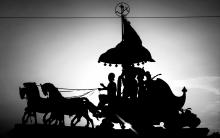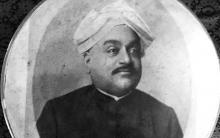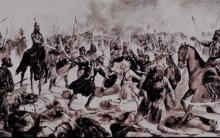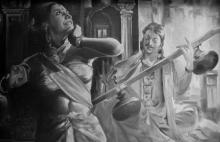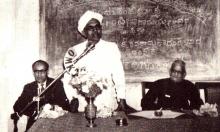Dhanadatta tried to convince him that his son is a suitable groom to his daughter. But Dharmagupta thought that Tāmraliptī was too far and did not agree to this proposal. Meanwhile Devasmitā, having seen Guhasena, was impressed by his qualities and handsomeness, informed through a messenger that she had fallen in love, eloped with him in the night to Tāmraliptī leaving behind all her relatives. There their wedding happened; they lived happily as husband and wife.
Author:hari
It is during the time of Jayapida that we see the next stage of evolution of Alaṅkāra-śāstra. It was led by two scholars in his court, Udbhaṭa and Vāmana, who can be considered as the successors of Bhāmaha and Daṇḍī, respectively. Udbhaṭa is known to have written a commentary called vivaraṇa on Bhāmaha’s Kāvyālaṅkāra, which is not available today. He is also supposed to have written a commentary on the Nāṭya-śāstra, which is also not available.
Unspirited Functioning
Despite all this, the administration showed no increase in its spirit and enthusiasm. I have thought about its reason. In my view, it was the lack of intensity, drive, and spirit of freshness in people, which caused this. Let me quote an example.
By nature, Narasinga Rao Purnaiah [i.e. Krishnamurti] was a great person. He was a generous man who carried a serious disposition and was a well-informed reader of books. His eyes had lost their sharpness. Yet he would closely read and grasp the most difficult of treatises.
[Alaṅkāra-śāstra is often called the youngest among Indian sciences. Several factors substantiate this statement. Of them, the fact that Alaṅkāra-śāstra boarded the bus of proliferation just before invasive Islamic hordes acted as a collective contraceptive to prevent the birth of original ideas is perhaps the most important. In this series of articles, H A Vasuki juxtaposes two extreme opposites to great effect – the worst of times producing the best of results.
Political acumen, rights and duties of the citizens, answerability of the government, the role of newspapers in protecting the welfare of the people – these things found expression in a hitherto unseen rigour for the first time in Karnataka (the erstwhile Mysore state) during 1928–29. The ‘Ganapati Riots’ of Sultanpet, Bangalore provided the stage for this.
As the days went by, Vāsavadattā’s love for the king of the Vatsas increased; her affection and respect towards her parents decreased; she was ready to defy them, then Yaugandharāyaṇa arrived, and making himself visible only to Vatsarāja and Vasantaka, exclaimed, “Mahārāja! Caṇḍamahāsena has deceitfully captured you; he desires to send you home only after getting his daughter married off to you; but if we ourselves abduct her now and go away from here, that would be a fitting response to his arrogance; we will also avoid being derided for lacking in manliness and courage.
The Nature of the Work
The Gītā is simultaneously a simple-difficult work or a difficult-simple work. What does it mean? Words may be simple to understand but the meaning of the sentence is difficult. The part that teaches nīti is simple; the part that establishes philosophy is not. It is thus easy to fall in the trap of thinking that one has understood the Gītā. However, it is hard to realise its essence in one’s mind.
ಲವನು ಹುಟ್ಟಿದ ವಾರ್ತೆಯನ್ನರಿತ ರಾಮ ತಾನೇ ಗುಟ್ಟಾಗಿ ವಾಲ್ಮೀಕಿಮುನಿಗಳ ಆಶ್ರಮಕ್ಕೆ ಹೋಗಿ ಮಗುವಿಗೆ ಜಾತಕರ್ಮಾದಿಗಳನ್ನು ಮಾಡುತ್ತಾನೆ. ಲವ ಆ ಬಳಿಕ ದರ್ಭೆಯ ಕೂರ್ಚದಿಂದ ನಿರ್ಮಿತವಾದ ಮಗುವಾಗಿ ಜನಿಸುತ್ತಾನೆ. ಇತ್ತ ರಾಮನು ನೂರು ಅಶ್ವಮೇಧಗಳನ್ನು ಮಾಡುತ್ತಾನೆ. ಇಲ್ಲೇ ಒಂದೆಡೆ ಪ್ರಸಿದ್ಧವಾದ “ರಾಮರಕ್ಷಾ ಸ್ತೋತ್ರ” ದಾಖಲೆಗೊಂಡಿದೆ. ಈ ಸ್ತುತಿಯು ಬಲಿದ್ವೀಪದಲ್ಲಿ ಕೂಡ ಪ್ರಚಾರದಲ್ಲಿದ್ದುದು ಗಮನಾರ್ಹ. ವಾಲ್ಮೀಕಿಯ ಮಾತಿನಂತೆ ಸೀತೆ ಶತಪತ್ರಕಮಲಗಳಿಂದ ಪೂಜಿಸುವ ವ್ರತವೊಂದನ್ನು ಕೈಗೊಂಡಿರುತ್ತಾಳೆ. ಅದಕ್ಕೆ ಬೇಕಿರುವ ಹೂಗಳನ್ನು ಲವನು ಅಯೋಧ್ಯೆಯ ಅರಮನೆಯ ಕೊಳದಿಂದ ಕದ್ದು ತರುತ್ತಿರುತ್ತಾನೆ. ಇದು ಅವನಿಗೂ ಅಲ್ಲಿಯ ಕಾಪಿನವರಿಗೂ ತಿಕ್ಕಾಟವನ್ನು ತರುವುದಲ್ಲದೆ ಸುದ್ದಿ ರಾಮನ ವರೆಗೂ ಹೋಗುತ್ತದೆ.


